There’s no doubt about it, your camper or RV is a major investment not only in money but in making memories.
Taking care of your camper when it’s not being actively used will go a long way toward preventing problems and wasting your time dealing with needless problems when you and your family answer the call of the open road.
This includes obvious things like checking the air in the tires before you leave, maintaining the charge in the batteries, and properly winterizing the plumbing system.
Though one debate faced by a lot of RV and camper owners is whether or not you should cover your camper when you aren’t using it?
The most obvious answer is, yes, it’s almost always a good idea to cover your camper if you aren’t going to be using it for a while.
Though there are times when covering it might not always be the ideal option, and you want to make sure you are covering it correctly.
To make sure that you are properly protecting your investment in family fun, it seemed like it was high time to get the down-low on the benefits and potential drawbacks of covering your RV.
Of course, the biggest concern is winter weather like freezing rain, sleet which makes covering your RV a big priority.
Though even when you aren’t using it in the spring and summer it might be worth considering a cover as a little extra added protection.
Travel trailer covers are important pieces of equipment for any trailer owner to consider.
It’s worth bearing in mind that travel trailers and RVs that are stored without proper protection can be laid bare to things like prolonged UV damage, fading, and even erosion to the exterior layer.
Not only can this damage the look and exterior functionality of your camper, but it can also lower the potential resale value.
So, let’s find out whether RV covers are likely to protect your vehicle, cut down hassle, and, ultimately, whether they are worth your money.
Benefits To Covering Your RV With An RV Cover
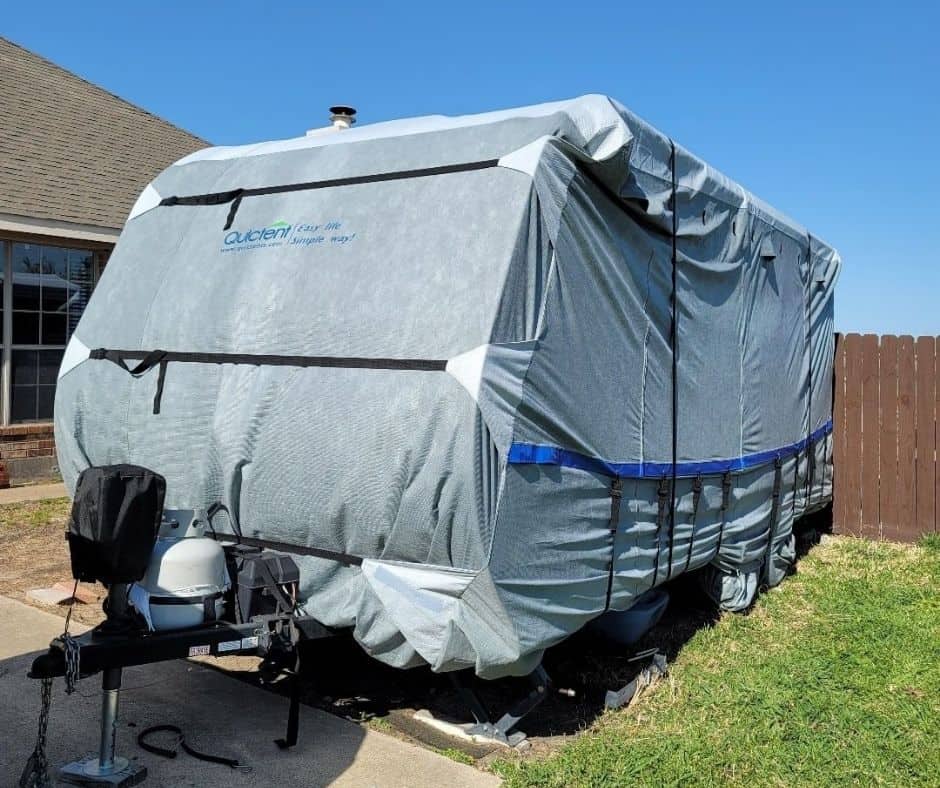
The knee-jerk reaction of a lot of camper and RV owners is that the manufacturer originally designed this recreational vehicle to withstand the elements.
While it’s true that RVs in general and campers in specific can take a lot of what the local weather has to throw at them, a cover can still be a major benefit, that helps protect your camper from things like:
Photodegradation
The rays of the sunbathe the earth in powerful UV radiation. As time goes on, it can start to damage different components of your RV in different ways.
This includes premature fading of paint and other colored components as well as potentially damaging awnings and even prematurely drying out exposed rubber.
Photodegradation is also a serious threat to the overall lifespan of exterior plastic components.
Leaves & Bird Droppings
It doesn’t have to be autumn for leaves to fall off trees and find their way into all sorts of nooks & crannies.
Just like how they can clog up the gutters on your house stray leaves can get stuck in an RV rooftop air conditioner as well as other places like the crevices around awnings.
At the same time, bird poop can also leave acidic traces that can start to damage the finish of your RV paint or your rolled-up awning.
Not to mention the real risk of bird droppings carrying bacteria and parasites.
Hail Damage
Even if you are simply draping a cover over your RV, it can protect against the abrasive scraping effect on your RV’s roof and paint job caused by tiny pieces of summer hail.
Though you will need a sound roofed structure to protect your RV from the dents and dings of large hail.
Water Leaks
Water leaks are an increasing concern as an RV or camper ages. Especially if you have a popup camper, hybrid camper, soft-sided truck camper, or a travel trailer with a slide-out section.
A quality cover prevents water infiltration from finding these leaks and reduces the potential costs of interior water damage.
What Are The Drawbacks Of Covering Your Camper Or RV?
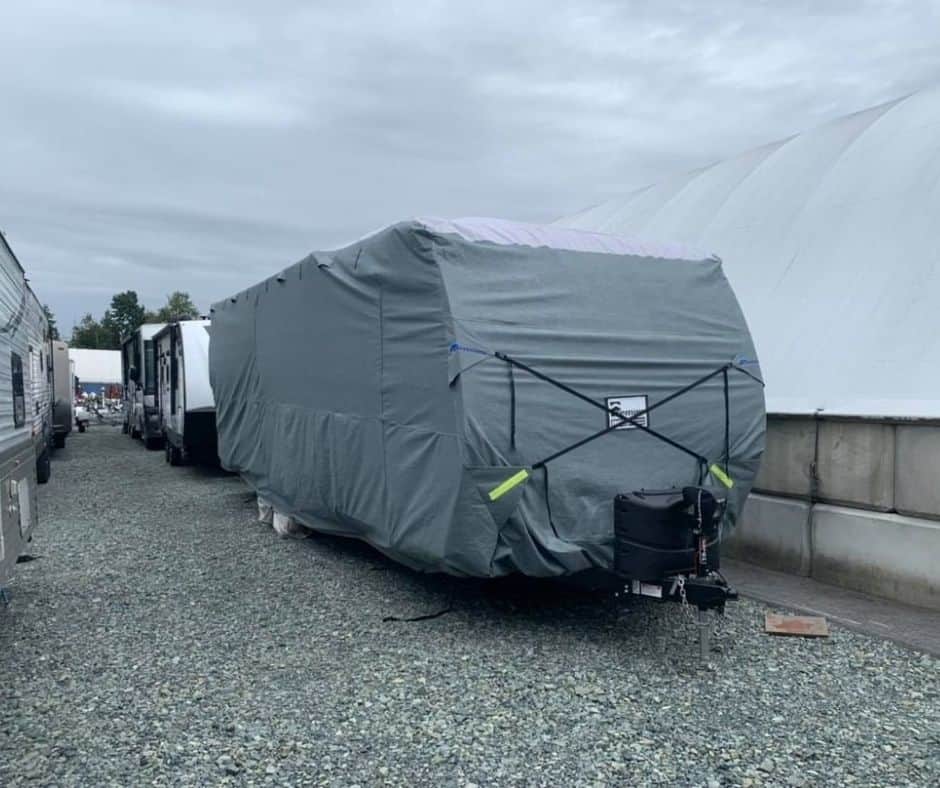
For as good as it is to protect your investment from the elements, there are some potential drawbacks to covering your camper or RV. They include things like:
Extra Cost
The type and size of the RV cover will affect the cost. Getting off cheap can leave you with minimal protection.
Cheap covers also tend to have a shorter lifespan, so it’s best to invest in a high-quality cover with the potential to last for years.
While it costs more upfront, you tend to get a better return on your long-term investment.
Labor
Properly spreading a cover over a large camper or RV can be a lot of work. Especially if you are trying to do it yourself.
If you are going to be taking the cover off and putting it back on multiple times in a year the extra effort can be a real headache.
Especially if you are being wise about securing it properly in place around the right with straps, stakes, or weights.
Wind Damage
The wind can be fickle. Sometimes a strong storm can get the wind under a cover blowing it violently and causing a rip, which is an awful waste of money.
Not to mention there have been more than a few times when an unsecured cover has completely blown off an RV.
Trapped Moisture & Water
High humidity and wind-driven rain can sometimes work their way under an RV cover. This can cause it to pool up and become trapped under the cover or inside the RV itself.
When left for a long enough period of time, this can cause mold damage, discoloration, and even possible water leaks.
Problematic Access
If you like to use your RV as additional storage space or as an improvised “Guest House” when it’s not in use a cover can get in the way of getting access to the main door.
In the summer, this might not be too big of a problem. Though the heavy snow and ice of winter can sometimes seal the edge of a cover down to the ground.
If you try to pull on the cover it can tear, so you have to take measures to safely melt the snow and ice that traps it to the ground.
How Much Does An RV Cover Cost
On the low end, you can expect to pay around $50 to $75 for a relatively small RV cover.
Though the larger RV covers are made from quality materials, with thoughtful engineering features designed into it like elastic corners and reinforced grommets can cost $100 to $225 or more.
What Is The Best Cover For My Camper Or RV?
The best type of cover for your camper or RV will depend on the size of the rig, as well as your budget.
You can expect that the larger the rig is, the more expensive the camper cover will be. Investing in a cheap cover might seem to be the easiest on your budget at first.
However, cheap materials and minimal quality in the design usually shortens an RV cover’s lifespan, which leads to you having to buy a new one again sooner.
Where Is The Best Place To Buy An RV Cover?
Most RV dealerships have a number of generic RV covers. A few will even keep custom covers for specific popular models in their lineup on hand in their active inventory.
If you’ve recently purchased an RV through that dealership, or you are negotiating the sale, you might be able to roll the cost of a custom cover into the purchase price.
The problem with going through a dealership is that while it might be convenient, these RV covers tend to come with a high markup cost.
If you have the time, and you are willing to do a little shopping you might be able to find a good deal on an aftermarket RV cover that will fit your camper on the internet.
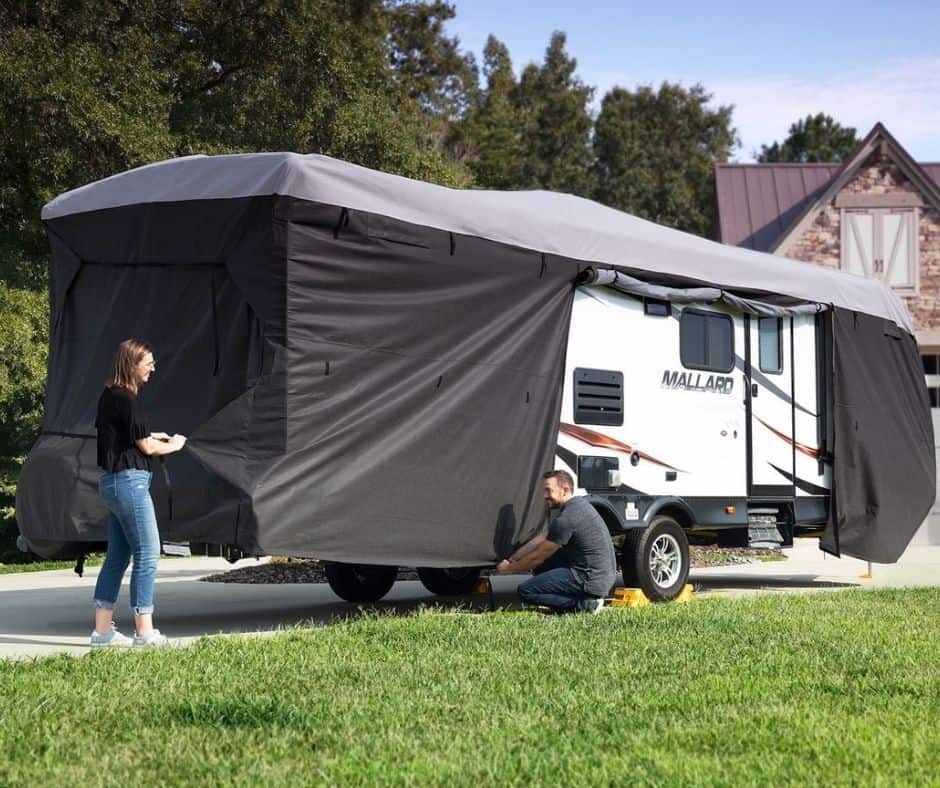
Best RV Covers For Snow, Sun, Wind And more
To help you better understand camper and RV covers we decided to wade into the competitive online RV cover marketplace to find some of the best options out there for protecting your travel investment.
These are some of the best of the best in a generic trailer, camper, and RV covers that also shine a light on the type of material and build quality that makes an RV cover worthy of your investment.
1. The BougeRV Travel Trailer RV Snow Cover
The BougeRV travel trailer cover is one of the best aftermarket RV covers money can buy.
This starts with four-layer construction That protects it from the elements, as well as reduces the risk of a single catastrophic leak.
At the same time, it also helps provide some thermal protection in extreme conditions as well as helping to protect the camper from small hail and things like light falling tree branches.
One of the great things about the BougeRV travel trailer cover is that it comes together in secured panels, which make it easier for one person to cover a camper on their own.
It also connects to the underbelly and structure of the camper via a series of secure clips and straps.
This means you can easily gain access to it in the wintertime without having to worry about the snow and ice pinning the edges of the RV cover to the ground.
2. King Bird Motorhome Cover
Many Class A motorhomes are too large to store in a garage or even a large storage locker.
Yet they still benefit from the added protection of a cover. Especially in the wintertime.
That’s where the King Bird Class A motorhome cover comes into play. It is made from 5 special layers of fabric that include an anti-UV top panel.
It uses multiple straps to secure it in place onto the motorhome without having to worry about ice and snow pinning the edges to the ground.
It also has a panel that you can carefully place over the door to let you gain access to the RV in the wintertime if you want to use it as storage or as an added bunkhouse for visiting overnight guests.
Frequently Asked Questions
Can I Just Cover My Camper With A Tarp Or Sheet Plastic?
Some cheap RV covers are made from plastic or tarp material. You might even be tempted to improvise with a series of large tarps and bungee cords.
Though the end result is typically a waste of time and effort. These materials tend to tear easily and are prone to water leaks no matter how deeply you overlap the layers.
While you might be able to get by for a single winter covering a teardrop trailer or popup camper with a tarp, it’s rarely worth the time and money to use cheap material covers on a travel trailer or larger RV like a motorhome.
Should I Cover My Travel Trailer In The Summer?
If you aren’t going to be using your travel trailer for a few weeks in the summer, you might want to think about covering it.
Not only will this help protect against sun fading on the exterior paint and the exterior paint, it can also go a long way toward preventing water leaks.
Some of the best travel trailer covers have multiple layers, which can even help reduce damage from small hail.
Should I Cover My Camper In Winter?
If you can’t store your RV indoors or under some sort of roof structure to protect it from the ice and snow of winter, then you absolutely need to cover it during winter months.
Snow can work its way into all kinds of nooks and crannies on your RV.
Especially when it starts to melt in the springtime, where melting water can work it’s way into places like the rooftop air conditioner and the seals of the slide-out sections during the warmth of the day. Then it freezes at night, expanding and causing damage.
How Do I Keep Rodents Out Of My Covered RV?
Rodent infestation is one of the common issues faced by anyone who stores an RV in the long term.
It is even more likely to be an issue in a properly covered RV as rodents are attracted to the superior shelter it provides over extreme cold temperatures.
This leads to mother mice and rats being more capable of raising multiple successful litters in your covered RV, where they might not be in the deep cold of an uncovered one.
One of the nice things about a covered RV is that the “Dryer Sheets” trick tends to work better and for longer, as the dryer sheet odor doesn’t fade due to moisture and weather changes in a covered RV, versus an exposed one.
Large quantities of mothballs can also deter mice and other rodents from making a home in your covered RV, but you do have to deal with the process of deodorizing the mothball smell in the spring.
Are RV Covers Worth The Money?
Covering your camper or RV when it’s not in use is a sound way to protect your investment.
Though you need to be willing to invest in a high-quality RV cover. Improvising with a few tarps and bungee cords is a recipe for frustration and likely a waste of money in the long run.
Ideally, you want to look for an RV cover that features multi-layer construction.
Then you should give priority to covers that have panels that allow for easy access to the door, and include secure straps that let you secure the cover directly to the underbody of the RV, rather than pinning it to the ground.

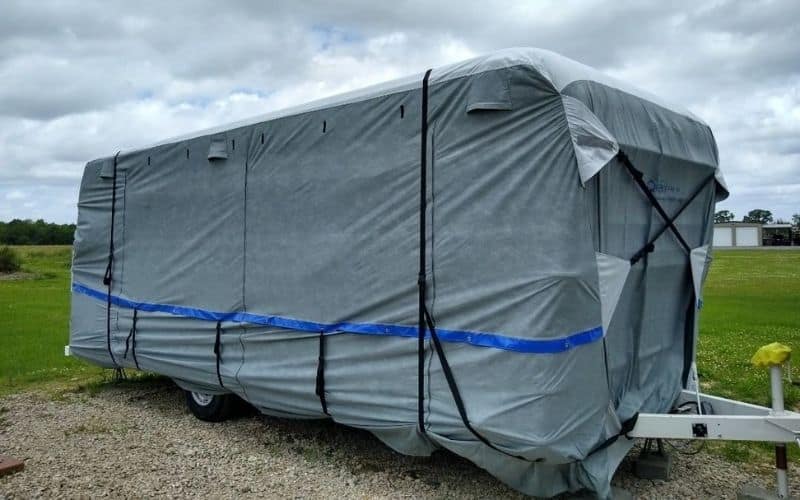
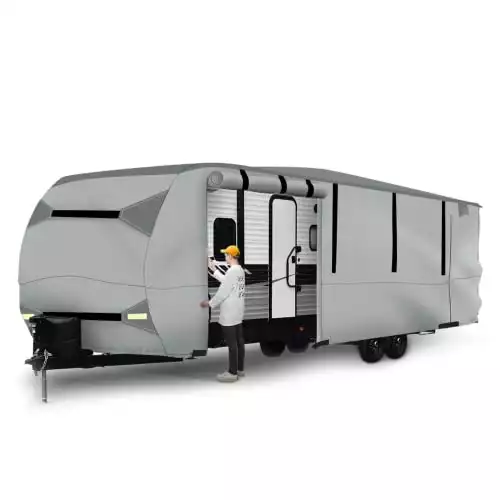
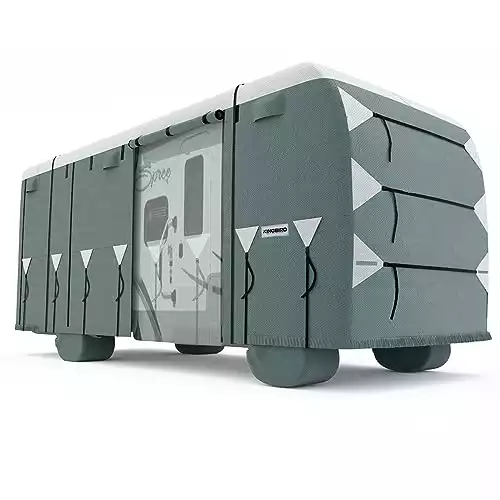
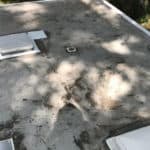
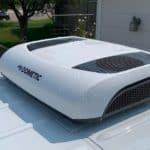

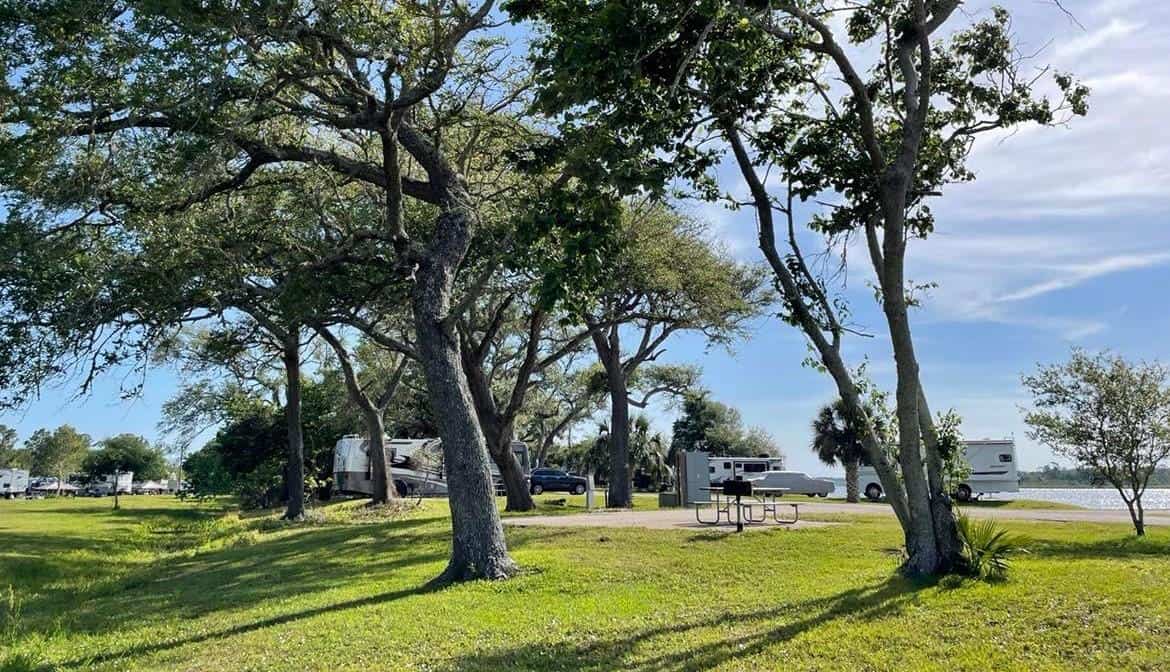
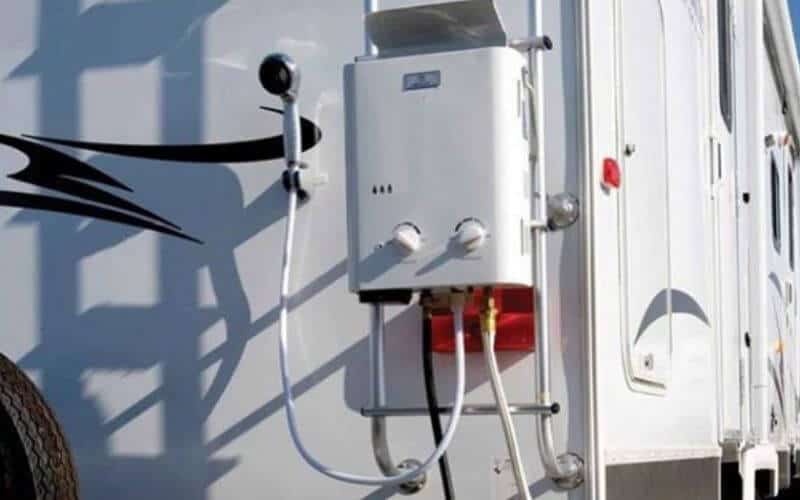
1 Comment
Ron Mroczenski
2 years agoDo not use MOTH Balls they do not deter mice.